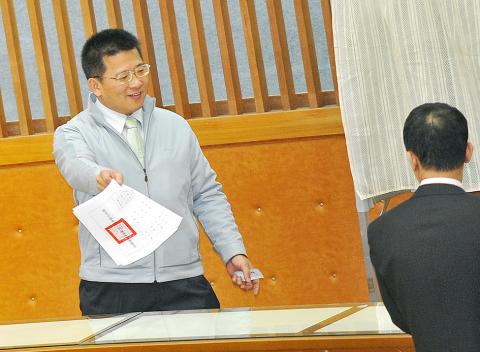In a landmark ruling that is expected to have wide political ramifications, the Taiwan High Court handed down a “not guilty” verdict to 10 then-New Taipei City councilors who “flashed ballots” to show observers their votes in the city council’s 2010 speaker election.
The ruling upheld the decision by the New Taipei City District Court in May last year, which found the 10 Democratic Progressive Party (DPP) councilors, including Lee Wan-yu (李婉鈺) and Sheng Fa-hui (沈發惠), who were charged with disclosure of state secrets and related offenses arising from the case, not guilty.
Yesterday’s ruling is seen by senior DPP officials and some civic groups as a positive development, as they have long advocated for changes to institute “recorded voting,” or “roll call voting,” instead of the current “secret ballots” in local councils.

Photo: Liu Hsin-de, Taipei Times
They see “recorded voting” as a better political reform measure to counter potential bribery and vote-buying, and to monitor councilors who vote against the majority of their constituents’ wishes.
The High Court ruling states that city and county council speakers and deputy speakers have job functions that entail important political and administrative policies, and previous court decisions cited Article 132 of the Criminal Code, which covers public officials’ disclosure of documents or information of a secret nature on matters outside of national defense.
In this decision, the judges said that in the case of the election of speaker and deputy speaker by councilors, the voting and balloting process in itself is not concerned with national political and administrative policies, and as such, the “ballot flashing” was not in violation of Article 132, and therefore the councilors were found not guilty.
The decision is final and cannot be appealed.
Following the High Court’s decision, Supreme Prosecutors’ Office Prosecutor-General Yen Ta-ho (顏大和) cited the different rulings between the 2010 council speaker election in Greater Kaohsiung and the then-Taichung City election in 1994.
Yen said he would make an “extraordinary appeal” to the Supreme Court on the not-guilty ruling in the “ballot flashing” case of Greater Kaohsiung councilors in the 2010 council speaker election, because he noted the court found Taichung City councilors guilty in a similar situation in 1994.
DPP spokesperson Huang Di-ying (黃帝穎) and legal counsel Wellington Koo (顧立雄) urged the judiciary to focus on bribery and vote-buying in local council elections, and to not waste resources going after councilors who cast the ballots.

INVESTIGATION: The case is the latest instance of a DPP figure being implicated in an espionage network accused of allegedly leaking information to Chinese intelligence Democratic Progressive Party (DPP) member Ho Jen-chieh (何仁傑) was detained and held incommunicado yesterday on suspicion of spying for China during his tenure as assistant to then-minister of foreign affairs Joseph Wu (吳釗燮). The Taipei District Prosecutors’ Office said Ho was implicated during its investigation into alleged spying activities by former Presidential Office consultant Wu Shang-yu (吳尚雨). Prosecutors said there is reason to believe Ho breached the National Security Act (國家安全法) by leaking classified Ministry of Foreign Affairs information to Chinese intelligence. Following interrogation, prosecutors petitioned the Taipei District Court to detain Ho, citing concerns over potential collusion or tampering of evidence. The

NEGOTIATIONS: The US response to the countermeasures and plans Taiwan presented has been positive, including boosting procurement and investment, the president said Taiwan is included in the first group for trade negotiations with the US, President William Lai (賴清德) said yesterday, as he seeks to shield Taiwanese exporters from a 32 percent tariff. In Washington, US Trade Representative Jamieson Greer said in an interview on Fox News on Thursday that he would speak to his Taiwanese and Israeli counterparts yesterday about tariffs after holding a long discussion with the Vietnamese earlier. US President Donald Trump on Wednesday postponed punishing levies on multiple trade partners, including Taiwan, for three months after trillions of US dollars were wiped off global markets. He has maintained a 10 percent

TRADE: The premier pledged safeguards on ‘Made in Taiwan’ labeling, anti-dumping measures and stricter export controls to strengthen its position in trade talks Products labeled “made in Taiwan” must be genuinely made in Taiwan, Premier Cho Jung-tai (卓榮泰) said yesterday, vowing to enforce strict safeguards against “origin laundering” and initiate anti-dumping investigations to prevent China dumping its products in Taiwan. Cho made the remarks in a discussion session with representatives from industries in Kaohsiung. In response to the US government’s recent announcement of “reciprocal” tariffs on its trading partners, President William Lai (賴清德) and Cho last week began a series of consultations with industry leaders nationwide to gather feedback and address concerns. Taiwanese and US officials held a videoconference on Friday evening to discuss the

PERSONAL DATA: The implicated KMT members allegedly compiled their petitions by copying names from party lists without the consent of the people concerned Judicial authorities searched six locations yesterday and questioned six people, including one elderly Chinese Nationalist Party (KMT) member and five KMT Youth League associates, about alleged signature forgery and fraud relating to their recall efforts against two Democratic Progressive Party (DPP) legislators. After launching a probe into alleged signature forgery and related fraud in the KMT’s recall effort, prosecutors received a number of complaints, including about one petition that had 1,748 signatures of voters whose family members said they had already passed away, and also voters who said they did not approve the use of their name, Taipei Deputy Chief Prosecutor